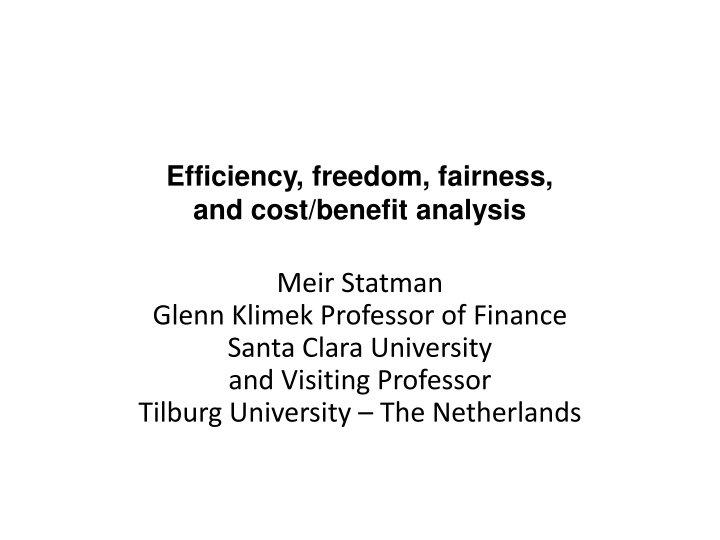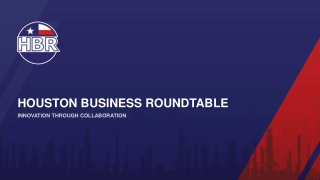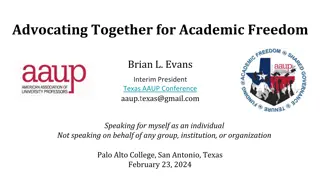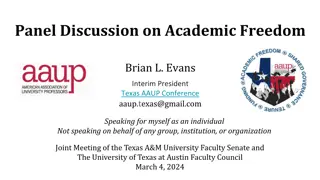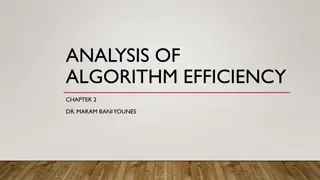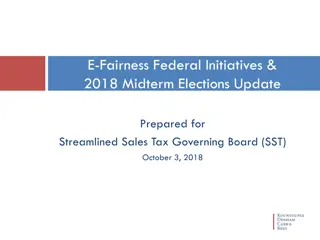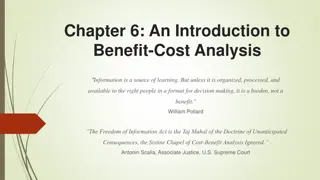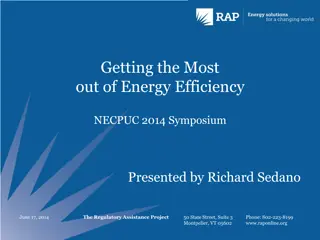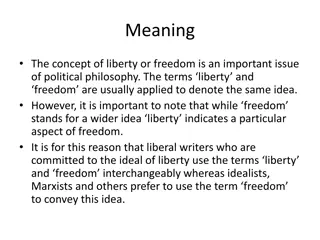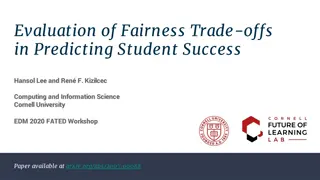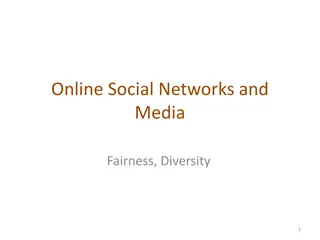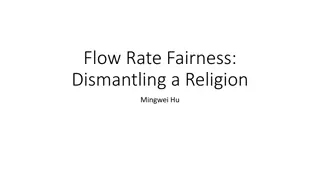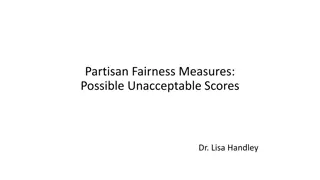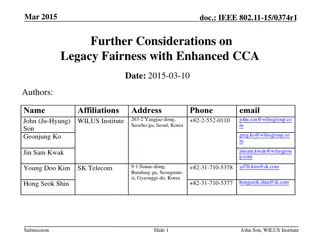Efficiency, Freedom, Fairness, and Cost/Benefit Analysis in Business Roundtable and Chamber of Commerce v. SEC
Meir Statman and Glenn Klimek discuss the importance of efficiency, freedom, fairness, and cost/benefit analysis in the context of the case Business Roundtable and Chamber of Commerce v. SEC. The case highlights conflicts between various interest groups such as unions, corporate executives, and shareholders, focusing on issues such as imposing costs, shareholder value, and agency conflicts. The discussion also touches upon George Stigler's Capture Theory of regulations and its implications on regulations like insider trading.
Download Presentation

Please find below an Image/Link to download the presentation.
The content on the website is provided AS IS for your information and personal use only. It may not be sold, licensed, or shared on other websites without obtaining consent from the author.If you encounter any issues during the download, it is possible that the publisher has removed the file from their server.
You are allowed to download the files provided on this website for personal or commercial use, subject to the condition that they are used lawfully. All files are the property of their respective owners.
The content on the website is provided AS IS for your information and personal use only. It may not be sold, licensed, or shared on other websites without obtaining consent from the author.
E N D
Presentation Transcript
Efficiency, freedom, fairness, and cost/benefit analysis Meir Statman Glenn Klimek Professor of Finance Santa Clara University and Visiting Professor Tilburg University The Netherlands
Business Roundtable and Chamber of Commerce v. SEC From the courts decision: The Commission has a unique obligation to consider the effect of the new rule upon efficiency, competition, and capital formation appraise the economic consequences of a proposed regulation
Business Roundtable and Chamber of Commerce v. SEC Concern that unions would impose costs on companies to benefit employees, reducing shareholder value
Business Roundtable and Chamber of Commerce v. SEC Unions are one interest group, possibly shortchanging shareholders to benefit employees Corporate executives (CEOs, members of boards) are another interest group, possibly shortchanging shareholders to benefits themselves Agency Conflicts between executives and shareholders Think of say-on-pay at Citicorp
Business Roundtable and Chamber of Commerce v. SEC The Roundtable and Chamber of Commerce speak for executives (funded by shareholders) Who speaks for shareholders? The SEC?
George Stiglers Capture Theory of regulations Interest groups, such as corporate executives or unionize employees, want more money Politicians and regulators and want more votes and more money Interest group organize to capture regulators and politicians with campaign contributions and future jobs (Politicians choose judges) Interest groups can do cost/benefit analysis What about the general public?
George Stiglers Capture Theory Michael Haddock and John Macey s (1987) applications to regulations of insider trading Two interest groups, corporate executives and Wall Street professionals, such as investment bankers Each group is cohesive and well-organized when compared with ordinary shareholders, not to mention the general public Therefore, only the interests of executives and investment bankers matter in determining regulations If executives are prohibited from using their inside information, the group standing first in line to receive it, for free, are investment bankers Investment bankers and other Wall Street professionals have an interest in prohibiting insider trading
George Stiglers Capture Theory Michael Haddock and John Macey s (1987) applications to regulations of insider trading But what is in it for corporate executives who are now forced to give away for free their valuable inside information? Executives are most interested in their jobs while investment professionals are most interested in inside information Executives receive as compensation from investment bankers the benefits of the Williams Act which forces investment bankers to reveal early their hostile takeovers intentions A bargain is struck between the two groups where each gets what is most valuable to it But what about ordinary shareholders and the general public?
Sam Peltzmans modification of capture theory Ordinary shareholders and the general public can vote against captured politicians This limits the power of interest groups
Sam Peltzmans modification of capture theory William Cary, Chairman of the SEC in 1961, invented insider trading regulations Cary understood the precarious position of the SEC. Government regulatory agencies are stepchildren [of] Congress and the Executive Donald Langevoort: Insider trading regulation help the SEC gain visibility and support Insider trading stories are wonderful drama: When they involve the rich and famous. They tap into images of power, greed, and hubris
Striking regulatory irons when hot Organized interest groups strike regulatory irons most of the time But, when enraged, the public strikes regulatory irons harder than interest groups Think of CARD in 2009 Did credit cards have anything to do with the financial crisis?
Striking regulatory irons when hot Signing CARD, Obama spoke about people chocking backs tears as they recounted credit card predicaments Obama accused card companies of writing contracts designed not to inform but to confuse
Fairness and Efficiency Fairness Rights Freedom from coercion (Libertarian free market) Freedom from misrepresentation (Voluntary disclosure) Equal information (Mandatory disclosure) Equal information processing (Paternalistic suitability regulations) Freedom from impulse (Cooling-off-period regulations) Equal power (Minimum wage regulations)
Recap Corporate executives use cost/benefit arguments to benefit themselves The public is not enraged enough to strike irons The SEC might be captured, ineffective, or hampered by the fact that benefits are harder to measure than costs Fairness goes beyond mandatory disclosure How about the right to equal power? How about serving the interests of shareholders and the general public?
